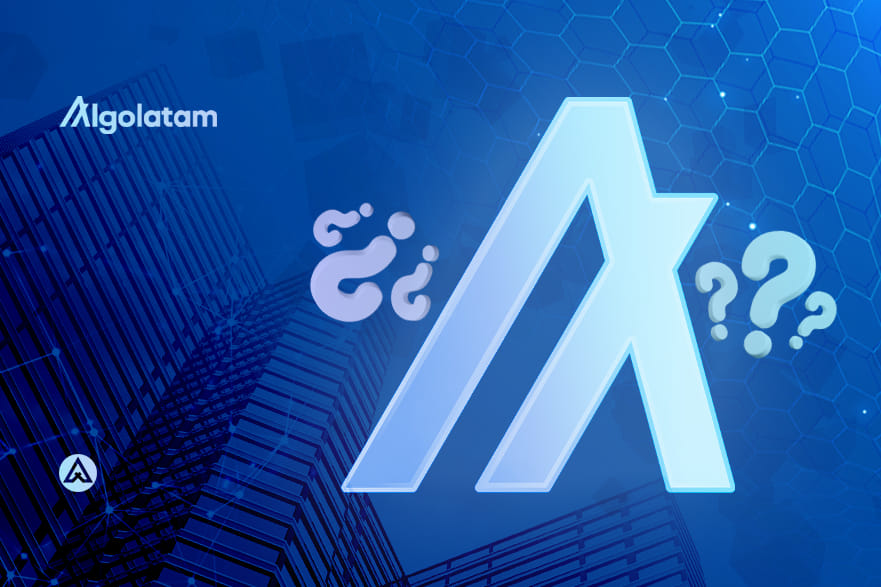
Algorand is a multipurpose blockchain network that is useful for a large number of utilities, among them, it is ideal for government infrastructures. In this article, we will discuss the benefits for these types of use cases.
Blockchain as underlying technology
In the origins, blockchain started with bitcoin as the support for its cryptocurrency, but today an amazing evolution has occurred. This technology has been advancing by leaps and bounds, giving rise to new generation networks, which allow infrastructure for a wide range of projects. These uses have given rise to a new paradigm.
Over time, once bitcoin was established, new networks emerged with the aim of offering new possibilities to developers. This is how Ethereum was born, with the introduction of smart contracts, which facilitated the development of dApps in the beginning. But this network began to have several drawbacks when the massive expansion of use cases began, due to various problems that have to do with its protocol.
Basically, Ethereum is a network that has a very high cost to carry out transactions, which ends up making operations too expensive. Due to this, all the projects that use this network suffer from disproportionate increases due to the so-called “gas” commissions. On the other hand, the speed of this network has been outdated over time, making it practically impossible to use it for everyday applications.
New generation networks
In the technological evolution of blockchain, the milestone is marked to date with the emergence of new generation networks. This type of network is proposed to solve existing problems to be applied in everyday life. This is how Algorand was born, a blockchain infrastructure that presents a protocol called «Pure proof of stake» (PPoS) which does not use the so-called «proof of work» (PoW) for the generation of blocks and validation of operations. This means that the use of «mining» is not required, an issue that has earned it the award of «negative carbon blockchain network» for its zero emission of pollutants.
Algorand solves the so-called “blockchain trilemma”, which states that no network could have scalability, security and decentralization at the same time. To make this possible, the Algorand protocol was developed from its origins by the brilliant MIT cryptographer Silvio Micali, taking into account the shortcomings that could be resolved to achieve the goal.
This is how a blockchain network has been developed that allows scalability without having to lose security parameters, while decentralization is guaranteed by the growth of the network itself.
Algorand and government infrastructures
Little by little, governments around the world are turning their operations towards blockchain technology, since it provides greater transparency for transactions and stored data. Algorand presents an efficient platform with parameters greater than those of other networks, such as Ethereum, to support applications developed by governments.
First of all, Algorand is much more affordable from a cost point of view for operations, since the commissions are just pennies. This subject is crucial for government applications, since the money that is used as an investment comes out of the pockets of taxpayers, therefore they will be very grateful not to pay more for a technology that is available to everyone.
On the other hand, Algorand is a completely secure network, designed by scientific professionals, who have extensive experience, both in the cryptographic and financial universe. This blockchain is completely “open source”, so plugins can be developed and the source code is visible for all to see.
There are currently several government use cases around the world that benefit from Algorand technology, just to name a few examples:
- The argentine company AYSA (Agua y Saneamientos Argentinos) demonstrates a successful implementation of Algorand’s blockchain technology. Together with Koibanx, the pioneer fintech company in tokenization of blockchain assets and payments in Latin America, it created the «EcoAySA» program, an «eco token» of the company that is integrated into merchant payment and discount channels.
- El Salvador uses Algorand as blockchain support for its official bitcoin infrastructure.
- In Colombia, «VitalPass» was developed, the world’s first digital vaccination passport against Covid-19, which, through advanced blockchain technology, will guarantee security, monitoring and transparency during the vaccination process.
- A large number of projects using Algorand as the underlying technology are underway in Africa, mainly related to digital identity. Furthermore, in recent days it was announced that Nigeria will use the “.algo” domain system for its official portals.
Conclusion
Blockchain technology is advancing by leaps and bounds, and little by little governments are beginning to use it for their infrastructures. Algorand turns out to be a network with extensive benefits when used for government applications, since it has efficient features, as well as low operating costs, security and guaranteed decentralization.
Aviso de responsabilidad:
Este artículo no contiene consejos financieros, ni recomendaciones de inversión de ningún tipo. La información brindada se ofrece sólo con fines educativos y didácticos en cuanto a tecnología Web3 y análisis sobre sus casos de uso.
Las inversiones con criptomonedas, NFTs, tokens u otros activos digitales conllevan riesgos y no se encuentran regulados, por lo que los lectores deben realizar su propia investigación antes de tomar cualquier tipo de decisión bajo su entera responsabilidad, así como adaptarse y observar las diferentes regulaciones legales según su país de residencia.
